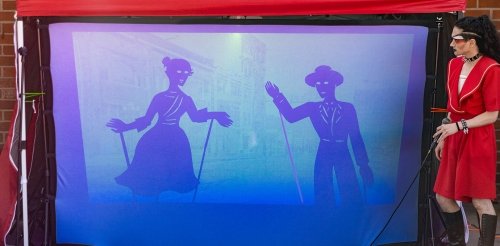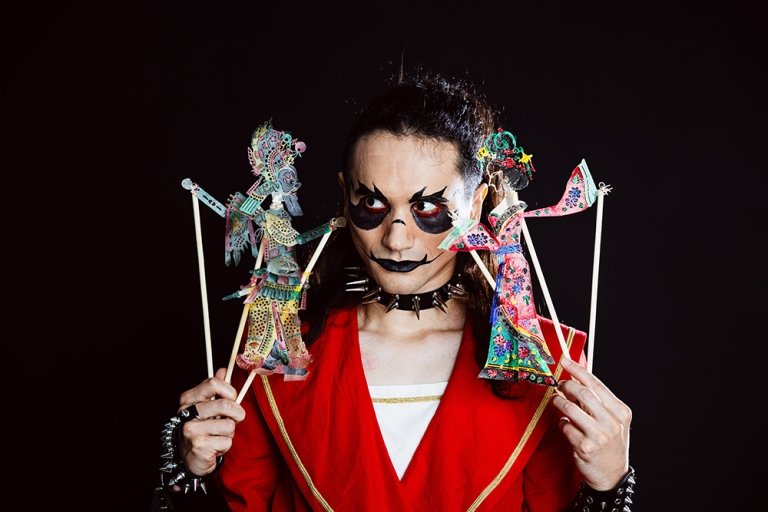The Sound and the Fury
Micah Huang ’13 seeks community healing and transformation with L.A.’s Hungry Ghost Festival

Huang ’13 presents a traditional-style puppet show during L.A.'s Hungry Ghost Festival.
Photo courtesy of Alex Zamora
By Tom Johnson
Micah Huang ’13 is a fervent believer in the idea of community engagement making lives better. But he goes one further. “My approach,” he said, “is founded on the idea that in order to benefit a community, your personal interests have to be inseparable from theirs.”
By his reckoning, this alignment happens because of a situation one is born into, or one that develops more organically from the flow of life. Regardless, he said what really matters is just that you have “some skin in the game.” For Huang, if efforts to serve the community succeed, everyone wins and prospers together. Conversely, if those efforts fail, all suffer the consequences together.
A composer, musician, and sound artist, Huang exposes social injustice as he explores music’s ability to heal and transform. A Fulbright fellow who traveled to Hungary to work alongside Roma people and amplify and help preserve their musical traditions, he served as director of the 2024 Los Angeles Hungry Ghost Festival, which was held in August in Alpine Park in Los Angeles’ Chinatown.
“The project went well,” he said, “and my team had a great time preparing a traditional style puppet show for the festival, in response to a special request from some of the elders in Chinatown.” The festival also included traditional music and dance, which was performed on the outdoor stage with more conventional sit-down performances taking place on the indoor stage.
Stereotypes vs. Reality
The Hungry Ghost Festival was the latest installment in a series of projects that started with the 2018 commemoration of the Los Angeles Chinese Massacre (19 Chinatown residents were lynched on the night of October 24, 1871). Huang said the festival was particularly important as a way of addressing concerns unique to the Chinatown community, which, he explained, tends to be overlooked and dismissed because of the disparity between stereotypes and street-level reality.
“My time at Pitzer enabled me to learn the skills that would become central to my process of seeking meaningful social change through performance art.”
— Micah Huang ’13
Consider just one datapoint as an illustration, Huang said. In 2021, Asian American communities received less than 0.2% of philanthropic donations despite making up nearly 7% of the country’s population.
“The list goes on and on from there,” he said. “We are considered a low-priority demographic in the ideology and rhetoric of struggles for racial justice in the U.S., with some questioning whether ‘Asians’ are even worthy of being considered people of color at all.”
Huang said he had been “running” from his Asian heritage for years, including during his time at Pitzer. Like many, he struggled daily with a variety of microaggressions. “Fortunately,” he said, “my time at Pitzer also enabled me to learn the skills that would ultimately become central to my process of seeking meaningful social change through performance art.”
The Hungry Ghost Festival, he added, taught him important lessons, too.
“I really learned a lot over the course of this project and was able to implement some promising new methods,” he said. “My favorite involved training young adults from Chinatown to work as live-sound engineers and then putting on a monthly open-mic series where they were able to gain paid work experience over six months.
“They became skilled and confident enough to work alongside a group of more seasoned professionals on the sound crew at the festival,” he continued. “It was a hands-on, practical approach to community engagement and economic empowerment that I think really owed a lot to the methods and values I learned during my time at Pitzer.”
The Social Justice Potential of Music
Huang decided to enroll at Pitzer as an undergraduate after studying for two years in a cross-discipline studies program at San Francisco State University. As a transfer student, Huang said he was “just overwhelmed by the kind of resources that Pitzer had as a private college. There was just a lot going on. I ended up taking a lot of music courses and [then] doing a self-created major.”
Unlike his parents, Hao and Rachel (both are members of the music faculty at Scripps College), Huang wasn’t automatically drawn to classical music. He didn’t study music formally until his teens, and he played guitar in many bands, including a punk band in Pomona. His tastes range widely, including international music, dance, and theater, which have all served as influences on his work today.

One influential experience from his undergraduate days was Pomona College’s Afro-Cuban Ensemble, a class in which he sang and played the conga and bell. He also learned to play the dundun (large two-headed drums) and bell in an informal group specializing in Malinke music (from the Mali-Guinea border region) that was organized by his friends and classmates, Andrew Kemble ’13 and Justin Dixon ’16.
These experiences, he said, caused him to start “reevaluating some of my own cultural roots, the presence of ancestors, and hearing the sonic properties of that music and East Asian music that is kind of ambient in my consciousness.”
That reevaluation eventually encouraged him to use music to explore the raw and still-painful experiences his own family had endured and left unattended. Investigating that wound and the traumas of old experiences turned into an opportunity to convene with his ancestors through his art.
That investigation resulted in his creation with his father of two acclaimed pieces, Blood on Gold Mountain, a theatrical podcast about the 1871 Chinese Massacre in Los Angeles (2021), and American Dreams/Asian Nightmares, a theatrical performance that examines the historical and contemporary effects of violence and trauma on Asian Americans and their descendants (2022).
Huang said it’s hard to tell what the future holds for him, his family, Chinatown, or the diverse constellation of Asian American communities. “However, as long as I’m alive and able, there will always be a place in my work for telling and celebrating the stories of my ancestors, even if the American mainstream insists on ignoring, belittling, attacking, and dehumanizing us.”